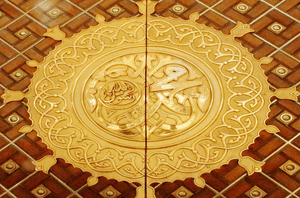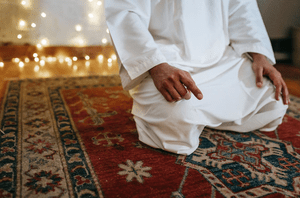A sick, heedless and hard heart is one of the greatest reasons for the lack of khushūʿ in ṣalāh. When the heart is rectified, the actions are also rectified as the Messenger of Allah ﷺ said, “There is a lump of flesh in the body: when it is sound, the whole body is sound and when it is corrupt, the whole body is corrupt. Truly, it is the heart” (Bukhārī).
Those with hardened hearts are condemned by Allah (‘azza wa jall): “So is one whose heart Allah has opened up for Islam and he is upon a light from his Lord (like one whose heart rejects it)? Then woe to those whose hearts are too hard to remember Allah. They have clearly lost their way” (39:22).
In another āyah, Allah (‘azza wa jall) warns His believers of the hardening of the heart: “Has the time not come for those who have believed that their hearts should become humbly submissive at the remembrance of Allah and what has come down of the truth” (57:16)?
And in the next āyah, Allah (‘azza wa jall) says, “Know that Allah gives life to the earth after its lifelessness. We have made clear to you the signs so that perhaps you will understand” (57:17).
Ibn Kathīr (raḥimahullāh) explains how this āyah indicates that Allah (‘azza wa jall) softens hardened hearts, guides those who are confused after they were astray, and alleviates hardships after they have become unbearable. Just as Allah brings the dead dry earth back to life by sending down abundant rain, He also guides the hardened hearts with the proofs and evidences of the Qur’ān. By inserting the light of īmān into these hearts, these hearts are softened after previously being blocked.
Therefore, do not give up. Even if you have struggled your entire life with khushūʿ, have hope and beg Allah (‘azza wa jall) to soften your heart and make it receptive to īmān, the Qur’ān and every form of good.
How to Soften a Hard Heart
a) Frequently remember Allah with your tongue & heart
Allah (‘azza wa jall) says, “Truly it is in the remembrance of Allah that hearts find peace” (13:28). Dhikr is one of the greatest means of protecting a heart from hardening. This is because excessive talking about other than Allah is one of its leading causes. The Messenger of Allah ﷺ said, “Do not talk too much without the remembrance of Allah. Truly, excessive talking without the remembrance of Allah hardens the heart; and the furthest of people from Allah is the hard-hearted person” (Tirmidhī).
The Messenger of Allah ﷺ said, “For everything there is a polish, and the polish of the heart is the remembrance of Allah” (Bayhaqī).
Ibn al-Qayyim (raḥimahullāh) explains that the heart rusts like copper and silver. Moreover, just as the heart can rust, it can also be polished through dhikr, to the extent that it can shine like a crystal mirror. Thus, when one neglects dhikr, the heart rusts, and when one remembers Allah, it shines. There are two things which cause a heart to rust: heedlessness (ghaflah) and sin. Conversely, the heart can be polished by two things: dhikr and istighfār (seeking forgiveness).
b) Avoid laughing excessively
Excessive laughing hardens the heart. The Messenger of Allah ﷺ said, “Do not laugh excessively as excessive laughter deadens the heart” (Tirmidhī).
c) Remember death frequently
The heart of one who is heedless of death and has excessive hope is dead. The Messenger of Allah ﷺ said, “Frequently remember the destroyer of pleasures,” i.e. death (Tirmidhī).
ʿAbdullāh b. ʿUmar (radiy Allāhū ‘anhumā) said, “I was with the Messenger of Allah ﷺ. A man from among the Anṣār came to him and greeted the Prophet. Then he said, ‘O Messenger of Allah, which of the believers is best?’ He ﷺ said, ‘He who has the best character amongst them.’ He said, ‘Which of them is the smartest?’ He ﷺ said, ‘The one who remembers death the most and is best in preparing for it. Those are the smartest’” (Ibn Mājah).
d) Visit the graveyards and reflect on the situation of its residents
The Messenger of Allah ﷺ said, “I used to forbid you from visiting the graves but (now) visit them, for it truly reminds you of the hereafter” (Tirmidhī).
When ʿUthmān (raḍiy Allāhu ‘anhu) would stop at a grave, he would cry until his beard was soaked (in tears). It was said to him, “Paradise and Hell-fire are mentioned, and you do not cry, yet you cry because of this?” So he said, “Indeed the Messenger of Allah ﷺ said: ‘Indeed the grave is the first stage of the hereafter. So, whoever is saved from it, then what comes after it is easier than it. And whoever is not saved from it, then what comes after it is worse than it.’” He said, “And the Messenger of Allah ﷺ said, ‘I have not seen any sight except that the grave is more horrible than it’” (Ibn Mājah).
e) Recite the Qur’ān
Allah (‘azza wa jall) says, “We send down in the Qur’ān that which is a cure and mercy for the believers…” (17:82).
Ibrāhīm al-Khawwāṣ (raḥimahullāh) said, “Five things cure the heart: reciting the Qur’ān with tadabbur (reflection), an empty stomach, the night prayer, humbly supplicating to Allah (‘azza wa jall) before dawn, and keeping the company of the righteous.”
f) Feed the poor and stroke the head of the orphan
A man once complained to the Messenger of Allah ﷺ about the hardness of his heart so the Messenger ﷺ said to him, “If you want to soften your heart then feed the poor and stroke the head of the orphan” (Aḥmad).
Abū Bakr (raḍiy Allāhu ‘anhu) was known for his excessive weeping. In Makkah, he built a masjid in his courtyard in which he would perform ṣalāh and recite Qur’ān. As he was a very soft-hearted person, he would not be able to control himself when he was reciting the Qur’ān and he would cry extensively. The women and children of the polytheists would gather to listen to his moving recitation, to the extent that it frightened the chiefs of the Quraysh.






